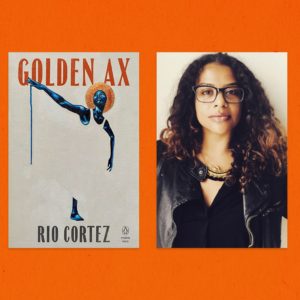 The poet Rio Cortez‘s collection Golden Ax, which is on the long list for the 2022 National Book Awards, in one that should be of interest to Latter-day Saint readers.
The poet Rio Cortez‘s collection Golden Ax, which is on the long list for the 2022 National Book Awards, in one that should be of interest to Latter-day Saint readers.
Although she is not Mormon, her collection, according to Radio West, is largely about her “growing up Black in the Salt Lake City area, exploring her family’s history of settling in the West — what she calls ‘Afro-pioneerism.’ She also recalls her recent ancestors, including athlete and Mormon convert Abner Leonard Howell.”
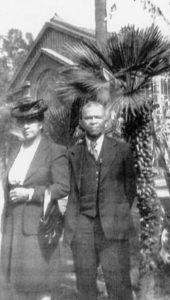
Abner Leonard Howell (1878-1966) was one of the main characters in The Last Mile of the Way, the third volume of Darius Gray and Margaret Blair Young’s Standing on the Promises series about African-American Mormon pioneers. His father, Paul C. Howell, came to Utah in 1888, and became the first Black policeman in Salt Lake City, a position he held for twenty years. Abner was the first Black teenager to graduate from Salt Lake (East) High School, where he was a football star, before attending the University of Michigan, where he also played football. He was baptized after coming back to Utah. He had many Church callings, including as a tour guide for the Los Angeles Temple during its open house events in 1955-56, and was on friendly terms with Heber J. Grant, David O. McKay, and Spencer W. Kimball. You can read a copy of Abner’s brief autobiography and testimony here.
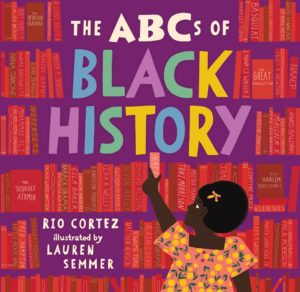 Rio Cortez is also the author of the New York Times bestseller The ABCs of Black History (Workman, 2020), and I Have Learned to Define a Field As a Space Between Mountains, which won the 2015 Toi Dericotte and Cornelius Eady Chapbook Prize.
Rio Cortez is also the author of the New York Times bestseller The ABCs of Black History (Workman, 2020), and I Have Learned to Define a Field As a Space Between Mountains, which won the 2015 Toi Dericotte and Cornelius Eady Chapbook Prize.
Cortez was interviewed on KUER’s Radio West program, where they talked a lot about how her life and heritage in Utah has impacted her, and her ideas about “Afro-pioneerism”.
She discusses her inter
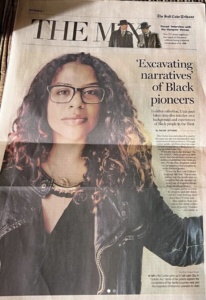
An interview with Cortez in Shondaland begins, “Cortez recounts learning about her second and third great-grandfathers as well as her great-aunt — all of whom lived in Utah, with some being involved with the Mormon church. Learning the historical context of her own family members being trailblazers in a church that’s been known to be predominantly white as well as uphold racist practices, Cortez coined the term ‘Afropioneerism’ as a way of ‘explicitly acknowledging that Black people were part of that’ movement. The poems in the book use both archival and imagined history, her own childhood experiences, and her love of fiction and sci-fi to explore race, class, identity, and the family she comes from.”
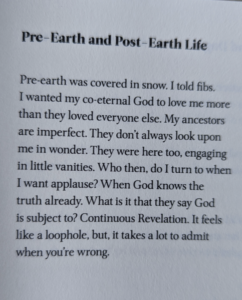 Cortez comments, “For me, Afropioneerism is using the same language that’s used in Utah all the time about Mormon religious pioneers who came to this state. It’s used as a way to talk about transgressing a brand-new frontier, a brand-new horizon, an experience. There were Black people involved in that movement, and it’s a way of explicitly acknowledging that Black people were part of that. With Afrofrontierism, I’m riffing on Afro-futurism in a way. It’s about Black people breaching new frontiers, new horizons, and doing what they’ve always done, which is creating something brand new. As for how it frames the book, Utah is a new Western frontier in terms of the history of the United States. And for my family, they were part of that early settlement. They came to Utah sometime between Reconstruction and what I’m finding in my research now, part of what was the California Gold Rush. I know that they never made it to California, if that was their intent. But I have a lot of family documents and letters, and so I can know a little bit about their lives through their own voices, which is really exciting. I know that they were here in communion with other Black settlers, meaning original pioneers that came with the Mormons who were Black Mormons. They themselves weren’t [all] Black Mormons, but I know that this was the community that they were a part of, and it’s also the community that I was raised in and that I came up in.”
Cortez comments, “For me, Afropioneerism is using the same language that’s used in Utah all the time about Mormon religious pioneers who came to this state. It’s used as a way to talk about transgressing a brand-new frontier, a brand-new horizon, an experience. There were Black people involved in that movement, and it’s a way of explicitly acknowledging that Black people were part of that. With Afrofrontierism, I’m riffing on Afro-futurism in a way. It’s about Black people breaching new frontiers, new horizons, and doing what they’ve always done, which is creating something brand new. As for how it frames the book, Utah is a new Western frontier in terms of the history of the United States. And for my family, they were part of that early settlement. They came to Utah sometime between Reconstruction and what I’m finding in my research now, part of what was the California Gold Rush. I know that they never made it to California, if that was their intent. But I have a lot of family documents and letters, and so I can know a little bit about their lives through their own voices, which is really exciting. I know that they were here in communion with other Black settlers, meaning original pioneers that came with the Mormons who were Black Mormons. They themselves weren’t [all] Black Mormons, but I know that this was the community that they were a part of, and it’s also the community that I was raised in and that I came up in.”
Cortez’s interest in the past and the future can be seen in her juxtaposition in the books opening of Brigham Young’s quote “This is the place” with jazz bandleader and composer Sun Ra’s catchphrase, “space is the place”.
See also this Literary Hub interview with Cortez.
